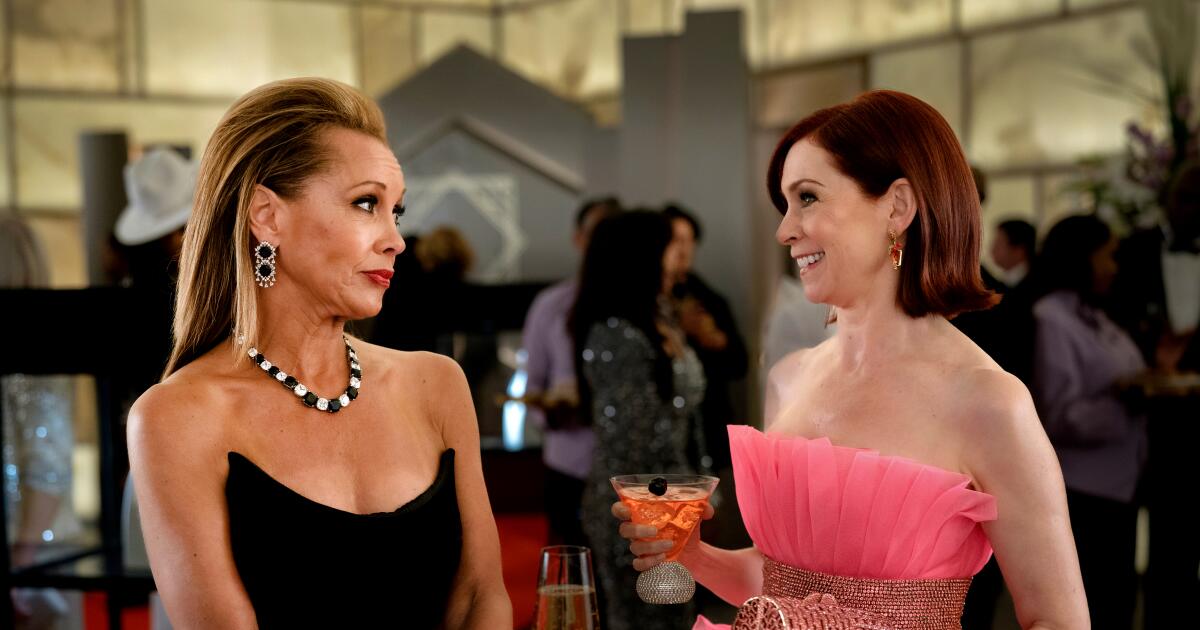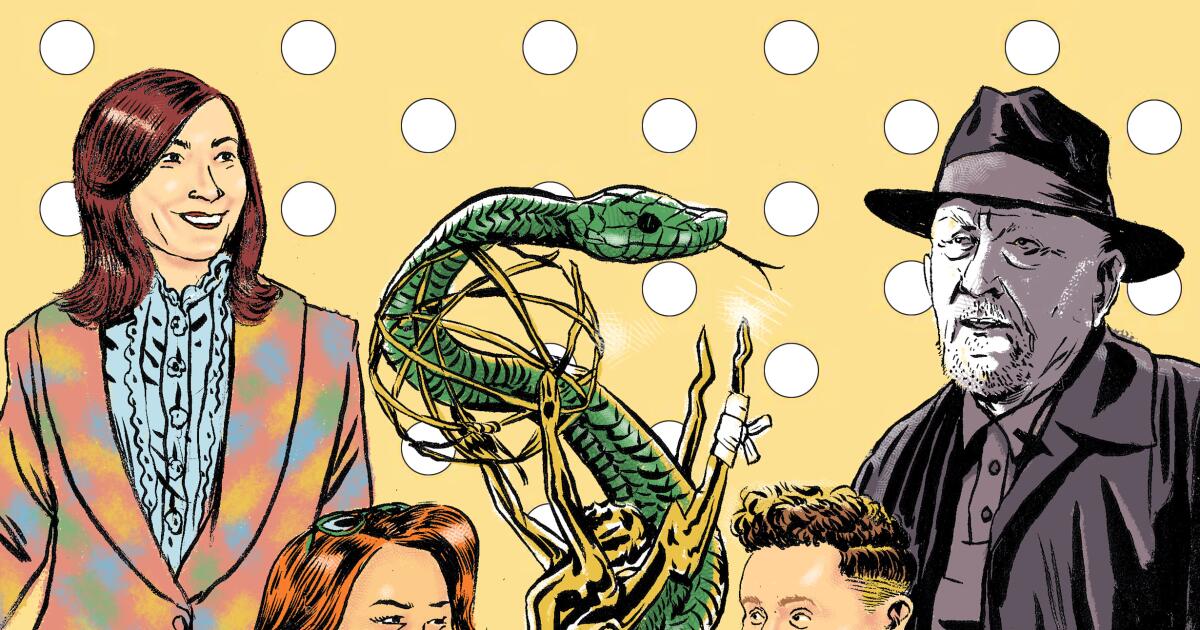“7 a.m.,” the pilot episode of “The Pitt,” introduces viewers to the organized chaos of a Pittsburgh hospital emergency room and the doctors and nurses who spend their days going from medical crisis to medical crisis.
“At the center of that wheel with all the spokes” is Dr. Michael “Robby” Robinavitch, says Noah Wyle, who plays the caring and beleaguered chief attending physician. “You can identify who is who in the show by how Robby is treating them. Am I being deferential to their expertise and education, or do I assume that they don’t know s— and I have to babysit them?”
The episode, written by series creator and executive producer R. Scott Gemmill and directed by executive producer John Wells, also hints at story arcs that will play out over the 15-episode first season. “There’s all kinds of little Easter eggs in there if you go back and look,” Gemmill says.
The Envelope chatted with Wyle, who also serves as an executive producer on the series, Wells and Gemmill about how the Emmy-nominated “7 a.m.” establishes “The Pitt’s” core characters.
Dr. Michael “Robby” Robinavitch (Noah Wyle)
“This is an emergency department. Not a Taco Bell.”
The series begins with Robby walking to work listening to “Baby” by Robert Bradley’s Blackwater Surprise. “One of the things that you’re always trying to do is just tell the audience who you’re going to follow,” Wells says. “Who’s going to be your character that introduces you to this world?”
Robby is the only character viewers see arriving to work. “We really wanted our characters to be learned about through the exposition of their workplace environment,” Wyle says.
“It was a conscious and thoughtful decision to not wake up in his apartment, not get a sense of his home decor, what his diet is, who he sleeps with,” he adds. “Those were all defining things that would immediately take him from being an everyman to being a specific man.”
Nurse Dana Evans (Katherine LaNasa)
“You sure you’re cool being here today?”
The first person Robby checks in with is Dana, the charge nurse, who Gemmill refers to as both the “den mother” and “air traffic controller” of the ER. “Robby’s relationship with Dana is very special,” he says.
Dana and Robby’s first conversation is about Dr. Jack Abbot (Shawn Hatosy), the ER doctor who works the night shift. Dana tells Robby that Abbot has gone to get “some air.” Her choice of words is significant because Abbot is actually standing on the hospital roof on the wrong side of the guardrail. “You know from the look on Robby’s face that he knows what ‘getting some air’ means,” Gemmill says. “There’s a lot of things that are not said but that are understood between these two characters.”
The creative team cut a scene from the pilot that revealed too much about the arc of Dr. Langdon, played by Patrick Ball.
(Warrick Page / HBO Max)
Dr. Frank Langdon (Patrick Ball)
“If you need me, I’ll be saving lives.”
Immediately introduced as the cocky senior resident , Langdon is later revealed to be stealing prescription drugs. But they were cognizant of keeping Langdon’s story arc a secret from viewers. “There was one sequence where we showed him with a slightly shaking hand,” Wyle says. “We felt like it tipped a bit too much. We ended up taking it out.”
Dr. Cassie McKay (Fiona Dourif)
“I’m a 42–year–old R2. So I have my own haters. Trust me.”
In the pilot, McKay, who is older than the other residents, gets involved with two cases. She immediately picks up that something isn’t right between a mother who has come in with her sullen adolescent son. She also instantly knows that the mother who burnt her hand on a Sterno is unhoused. “What she lacks in not having [started] at a younger age, she makes up for with life experience.” Gemmill says.

Isa Briones as Trinity Santos in “The Pitt.”
(Warrick Page / HBO Max)
Dr. Trinity Santos (Isa Briones)
“I got 50 bucks says she doesn’t last through this shift.”
Intern Trinity Santos comes in hot with a palpable ambition. She openly mocks her fellow residents with derogatory nicknames, but her outward bravado belies her backstory. “She has a history of abuse and trauma that has made her want to wear a suit of armor and tell the world to go f— itself before she has a chance to be hurt again,” Wyle says. “And we peel that layer to the very end of the run when you find out about what happened to her. Her compassion and empathy really comes into the fore in the latter half of the season.”
Dr. Melissa King (Taylor Dearden)
“I can’t tell you how excited I am to be here today.”
Nothing seems to get in the way of second-year resident Mel King’s outwardly cheerful demeanor. “She was a tricky one,” Gemmill says. “We walk a fine line with her. She’s fairly obviously neurodivergent, and I just wanted to really introduce a character like that and do it justice and do it properly, and Taylor has done a great job embodying that.”

Shabana Azeez and Gerran Howell in “The Pitt.” The latter’s Dr. Whittaker provides “comic relief” in the early episodes through the indignities he suffers.
(Warrick Page / HBO Max)
Dennis Whitaker (Gerran Howell)
“I’ll be this lady’s age by the time I pay off my student loans.”
Fourth-year medical student Whitaker doesn’t start off well. His phone rings during a moment of silence for a deceased patient and he injures his finger moving a patient off a gurney.
“He’s very much the comic relief in the early episodes,” Wyle says. “He’s the guy that we put through a series of degradations and humiliations, but like the Energizer Bunny, he keeps coming back. By braving all of these things, he becomes extremely endearing.”
Dr. Victoria Javadi (Shabana Azeez)
“I’ve earned the right to be here.”
Twenty-year-old prodigy Dr. Victoria Javadi is the daughter of two doctors. In the pilot, the third-year medical student faints the first time in the exam room and has painfully awkward exchanges with her peers. “You imagine that she was never with anyone her age,” Gemmill says. “Imagine a study group when she was in med school and she’s 14 or 15 years old. No one’s going to want to hang out with her. She becomes like a mascot to them. Her thing is to overcome that mascot image and become a person unto herself.”






